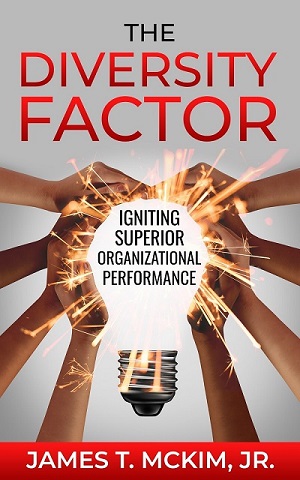James T. McKim’s new book reads almost like a position paper. There’s a systematic breakdown of ideologies and topicalities that feel like the concise peeling of an onion. There’s never a sense things are rushed over, almost to a fault. Even the title is indicative of this – The Diversity Factor: Igniting Superior Organizational Performance. McKim is painfully meticulous, because the concept he’s pushing requires that distinctive kind of precision, Specifically, what the correct implementations are to create an equity-based and diverse workplace organization for a postmodernist world.
RELATED URL: https://organizationalignition.com/
Wisely he highlights how much of a generational component is involved with retooling outdated practices, stating: “The 2021 Deloitte Millennial Survey shows that 74% of (millennials) believe their organization is more innovative when it has a culture of inclusion. If businesses are looking to hire and sustain a millennial workforce, diversity must be a key part of the company culture. The survey also shows that 47% of millennials are actively looking for diversity and inclusion when sizing up potential employers.
Companies will stay relevant only if they have a diversified employee base going forward.” He follows this up with: “…In sum, this seems to point to a more diverse society. And as the population becomes more diverse, societal norms become more diverse. Thus, in order to keep employees, an organization needs to know the trends and understand those societal shifts around the employee base and build a culture that is welcoming to as many people in that employee base as possible.
Otherwise, it will suffer attrition, not be able to attract new employees, and eventually be forced to fold. Not only is it important to understand societal norms from an employee perspective, it is also important to understand societal norms from the perspective of the perception of the organization, and its reputation, at the most basic level of how society sees organizations.”
Because McKim is able to make what some deem inscrutable so bell-clear and concise, you’ll have a hard time finding yourself able to buck the relevancy and importance of the data presented. Move over from the term ‘woke’ critics of ideology like McKim’s are quick to resort to. These are just facts, and facts do not require speculation. McKim never has to justify himself to the reader because there are no ambiguities factually or topically that he finds himself marred by. For every statement, there is an elaborate set of backups in the form of personalized examples, polls, statistics, and spreadsheets accounting for the content.
BUY THE BOOK: https://www.amazon.com/Diversity-Factor-Igniting-Organizational-Performance/dp/B09ZCKR3B6
“An example of how discriminatory actions have implications for an organization’s reputation is fast-food restaurant Chick-fil-A. Despite Chairman Dan Cathy’s statements against same-sex marriage, the company’s generous funding of anti-gay groups, and the claims that the outspokenly Christian corporation doesn’t discriminate against workers, the company has been sued at least a dozen times for employment discrimination. This has caused minorities across the country to boycott the restaurant and bring its sustainability into question,” McKim writes, featuring one of the most pertinent, cultural examples in recent memory.
Cyrus Rhodes



























